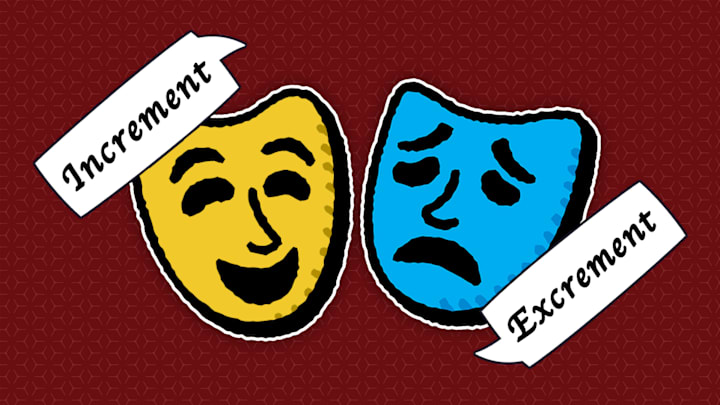Plenty of antonyms are as straightforward as they seem: inside versus outside, agree versus disagree, and so forth. But prefixes don’t always work how we expect them to, words don’t always keep the definitions they started with, and morphological similarities don’t always correlate to clear semantic ones. All this to say that the English language has a lot of word pairs that sound like they should be antonyms—but definitely aren’t. Here are the explanations behind 10 of our favorites.
- Flammable and inflammable
- Progress and congress
- Increment and excrement
- Famous and infamous
- Terminate and exterminate
- Regardless and irregardless
- Thaw and unthaw
- In-laws and outlaws
- Appoint and disappoint
- Valuable and invaluable
Flammable and inflammable
The existence of flammable makes us assume that the in- of inflammable must mean “not.” But in- can also mean “in, into, to, toward, on, upon,” and it’s serving that purpose in inflammable. If something’s inflammable, it’s capable of having flames in or upon it—you’re able to inflame it. In other words, inflammable isn’t “in + flammable.” It’s “inflame + able.”
Progress and congress

Since pro and con mean “for” and “against,” respectively, it would make sense for progress and congress to involve being for and against whatever gress is. But gress means nothing by itself (though it is technically a variant spelling of both grass and grease). More importantly, the con of pros and cons is shortened from contra, Latin for “against.” Con- as a prefix means “with” or “together”—it’s essentially the Latin version of English’s co- (con also literally means “with” in Spanish and Italian). Progress and congress come from progressus and congressus, Latin nouns that both derive from the verb gradi, meaning “to walk or step.” So progress is walking forward, and congress is walking together.
Increment and excrement
“Increment” seems like what you’d call excrement that hasn’t yet left the body. The words’ Latin etymons are similar, too—incrementum and excrementum—but they’re derived from different verbs. Incrementum is from increscere, meaning “to grow in or upon” (like increase) and excrementum is from excernere, “to sift out or discharge” (like excrete).
Famous and infamous
Infamous doesn’t mean “not famous.” It means “notorious” (i.e., “famous for bad stuff”) as did its Latin ancestor infamis. You could argue that infamous is an opposite of famous in the “celebrated, renowned” sense (as opposed to just meaning “widely known”). Ironically, though, famous also once meant “infamous”—the terms were sometimes even used together for emphasis. Geographer Robert Morden called Thomas Stucley “that famous infamous English rebel” in a 17th-century book, for example.
Terminate and exterminate

The Latin verb terminare means “to mark the end or boundary,” and exterminare refers to driving someone or something outside that boundary. The definitions of terminate and exterminate have evolved away from boundaries, but links to their Latin forebears persist: Termination usually marks an end—of a contract, for example—and extermination still involves getting rid of something (though it’s now typically accomplished with annihilation rather than banishment).
Regardless and irregardless
Irregardless, which just means “regardless,” might be the English language’s most infamous false antonym. But it’s not that new: People have been using the term at least since the late 18th century, and Merriam-Webster added it to the dictionary nearly a century ago. The Oxford English Dictionary thinks it’s “probably a blend of irrespective and regardless,” but Merriam-Webster has another theory—that ir- is working as an intensifier to really highlight the absence of regard.
Thaw and unthaw
Using prefixes as intensifiers is a fairly common linguistic tendency, especially for words that connote a lack or an undoing. Unthaw, meaning “to thaw,” is a textbook example. Thaw means “to unfreeze,” but nothing about the word itself suggests that an action—freezing—is being reversed. So people sometimes (however unwittingly) tack on un- to strengthen the sense of negation. Similarly, peeling an orange involves removing the peel—but the verb peel doesn’t do much to convey removal, so unpeel has cropped up as an alternative. It just means “to peel.”
In-laws and outlaws

In-law didn’t originally mean that someone was related to you because of a government-issued marriage license. The law in question was Christianity’s Canon Law, part of which prohibited marriage between certain relations. In other words, mother-in-law basically meant “Canon Law considers her my mother, so we’re never allowed to get married.”
Outlaw involves law in a more general sense. Historically, the term often referred to people sentenced to live outside the protections of the law as punishment—and inlaw actually was its antonym, meaning “one who is within the domain and protection of the law,” per the OED. But inlaw didn’t make it into the modern lexicon, and these days we typically use outlaw for miscreants who operate without regard for the law.
Appoint and disappoint
Appoint and disappoint are no longer antonyms because we’ve dropped the senses that clarify their relationship. The earliest definition of disappoint, dating back to the 15th century, was “to remove from office.” But appoint didn’t only mean “to put in office”—it also had a broad array of senses that involved arranging and settling matters. This inspired opposing senses of disappoint that involved thwarting objectives and failing to fulfill expectations. Over time, we leaned into the undertone of emotional frustration that so often comes with that kind of failure, which has now overtaken disappoint’s other functions.
Valuable and invaluable
Invaluable makes more sense if you just forget the word valuable and build the definition piece by piece: “not able to value”—i.e., the item in question is so special that you can’t assign a value to it. But like appoint and disappoint, these two terms have opposed each other in the past: Not only did valuable once mean “capable of having its value measured,” but people have also used invaluable as “worthless.”
Learn More About Language:
